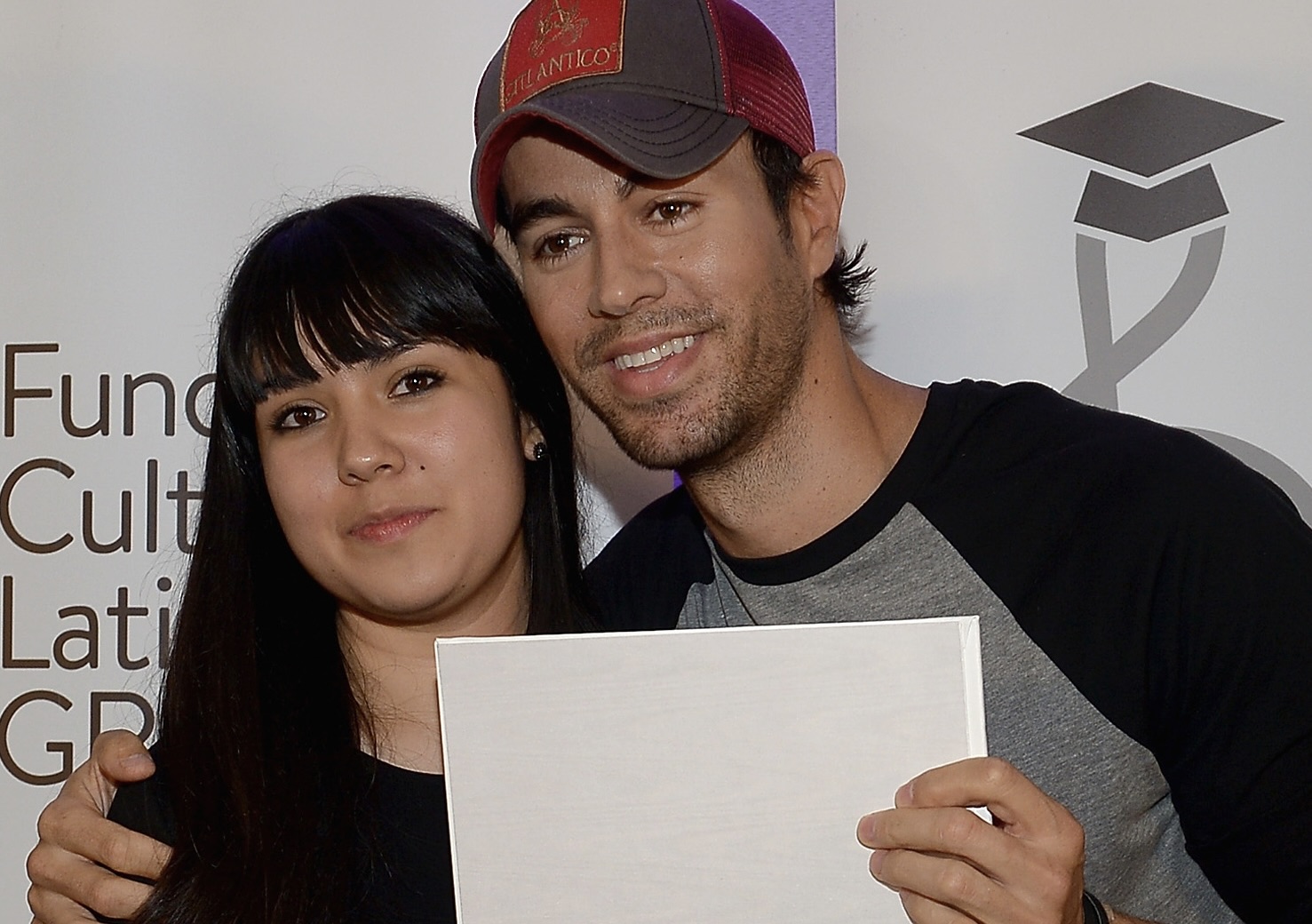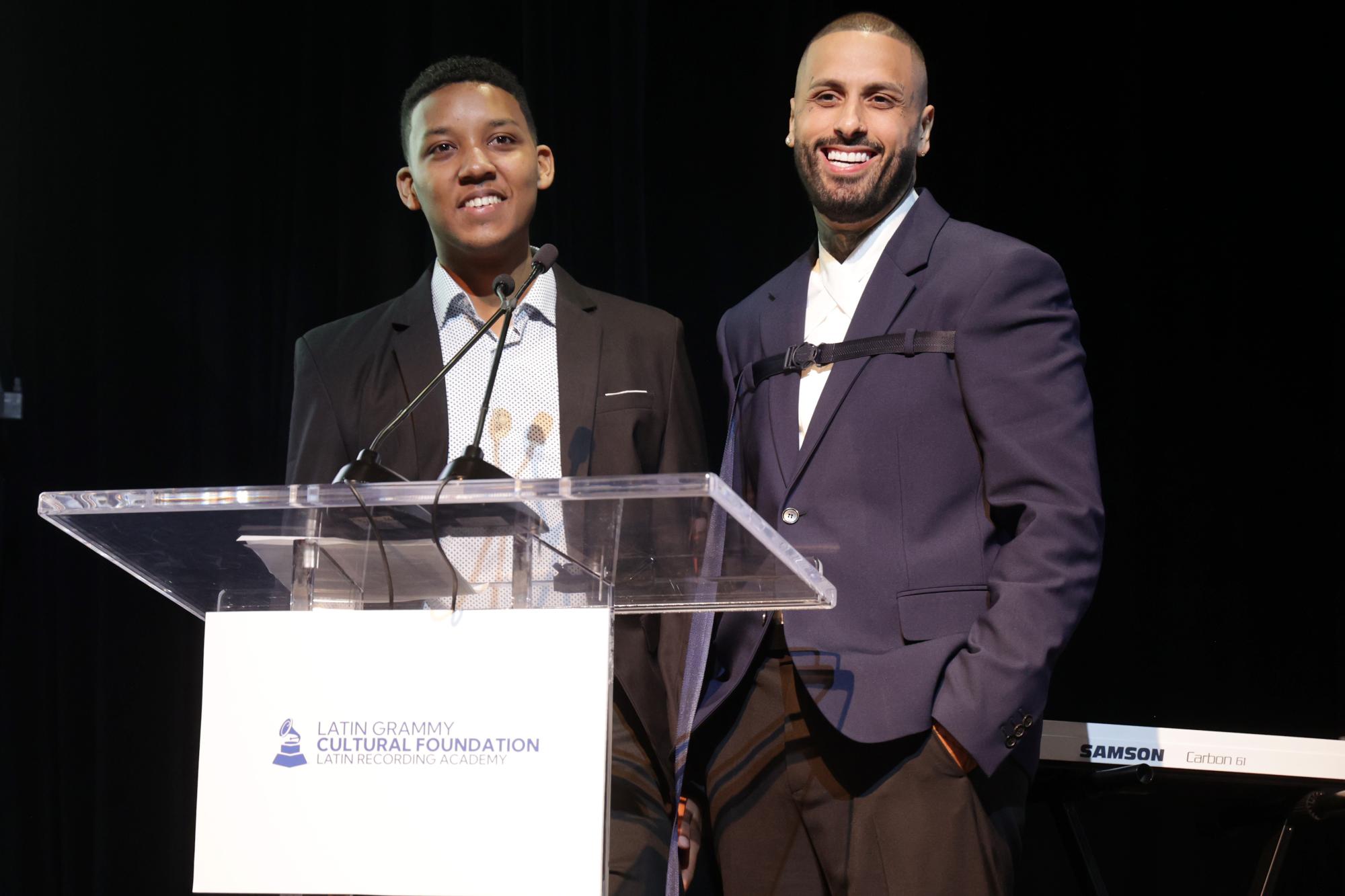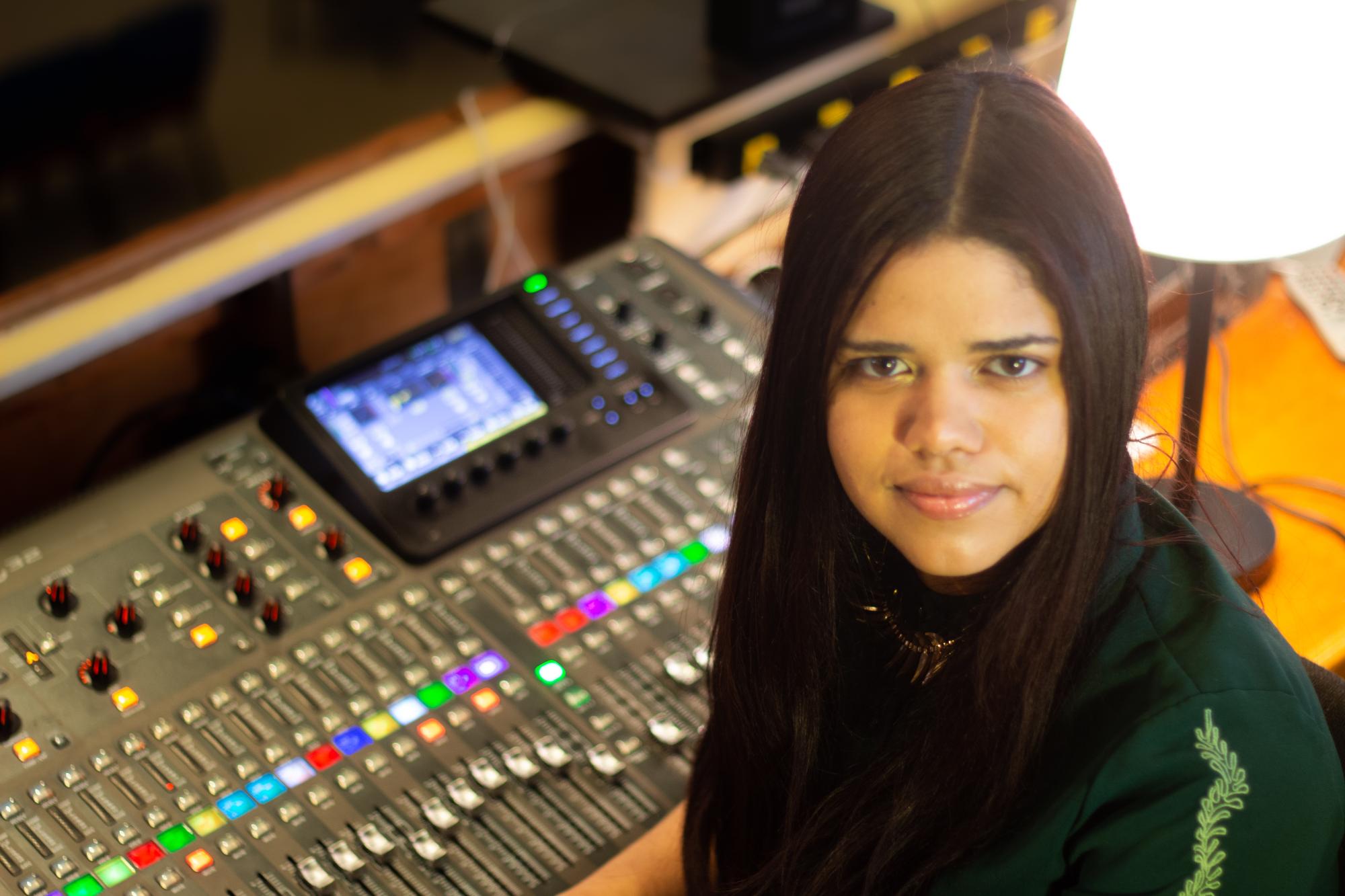Foundation Has Awarded Berklee Students Over $5 Million in Scholarships Since Inception

The 2023 Prodigy Scholarship sponsor, reggaeton star Nicky Jam (center), on stage in Miami with previous scholarship award recipients.
Image courtesy of Latin Grammy Cultural Foundation
Itzel Reyna’s obsession with jazz started suddenly. She was 16 and had no background in music when she went to see a documentary about the genre. What she heard in that Mexico City movie theater sounded to her like freedom.
“Jazz was really like a revelation,” Reyna B.M. ’19, now 30, says.
She went home and told her family she needed a saxophone. “My family was like, ‘But…really?’ It was like out of nowhere,” Reyna recalls.
What followed over the years was an intense dedication to the instrument—one that led her to getting an associate degree in Mexico, to attending Berklee’s Five-Week summer program, and to eventually landing the first Latin Grammy Cultural Foundation Prodigy Scholarship, the Enrique Iglesias Scholarship(Opens in a new window).

Itzel Reyna B.M. '19 and Enrique Iglesias
Image courtesy of Latin Grammy Cultural Foundation
Established in 2015, the $200,000 scholarship covers a student’s tuition and room and board for all four years at Berklee and is cosponsored by the Latin Grammy Cultural Foundation(Opens in a new window) and a prominent Latin artist. The artists change each year and have included Iglesias; Juan Luis Guerra ’82, ’09H(Opens in a new window); Miguel Bosé(Opens in a new window); Carlos Vives(Opens in a new window); Emiio and Gloria Estefan ’07H(Opens in a new window); Julio Iglesias ’15H(Opens in a new window); Juanes(Opens in a new window); and Sofia Carson(Opens in a new window).
The 2023 Prodigy Scholarship(Opens in a new window), which was awarded in Miami in August to Dominican pianist Leomar Cordero Castro, was sponsored by Puerto Rican reggaeton star Nicky Jam(Opens in a new window).
During the Miami award event, a video was played of the Zoom call notifying the Cordero family that Leomar, 20, had won the award. The call started with a split screen showing Nannette Vélez B.M. ’06, the foundation’s senior director of programs; Raquel Egusquiza, its executive director; and Cordero.
“We have a member of the committee who’s going to join the call now to ask you a question,” Vélez told Cordero. At that moment, Nicky Jam appeared to share the news. Cordero and his father, seated next to him, broke out in smiles and hugged. Nicky Jam, whose mother hails from the Dominican Republic, said it fills him with pride that a Dominican will attend one of the best colleges in the world. He also joined Cordero and past scholarship recipients on stage in Miami.

Leomar Cordero Castro and Nicky Jam in Miami in August.
Image courtesy of Latin Grammy Cultural Foundation
On the Zoom call, Cordero thanked him for the award and for “motivating not only me but also a large number of young people who are passionate about Latin music and our culture.” In doing so, he underlined the mission of the Latin Grammy Cultural Foundation, which was created by the Latin Recording Academy to further awareness and appreciation of Latin music’s contributions to world music and to provide educational opportunities that advance Latin music and its heritage.
A large chunk of those educational opportunities are realized at Berklee. Of the $9.3 million in scholarships and other aid the foundation has awarded since its inception, about $5 million has gone to Berklee students. The Prodigy Scholarship is the largest of the annual awards but the foundation also gives out 43 other scholarships(Opens in a new window) each year: three worth $100,000 each and 40 at $10,000 apiece. The vast majority of students who receive these awards attend Berklee.
To be eligible for the Prodigy Scholarship, a student must have been accepted to Berklee, be between the ages of 17 to 25, have financial need, and have a passion for Latin music. Applicants do not need to be Hispanic or Latin, and they can be from any country.
A committee of accomplished musicians around the world reviews roughly 1,000 applications each year and flags a few candidates for the top award. Of the candidates who have the highest scores, the sponsoring artist chooses which one will receive the Prodigy award, taking into consideration the applicant’s musicality, technique, tone, rhythm, musicianship, originality, and overall performance.
Berklee’s collaboration with the foundation goes back to the foundation’s beginnings, when the college helped it establish a process to identify talent, merit, potential, and need. The foundation was also able to look at Berklee’s structure for educational outreach and programming as a blueprint for how to build a multinational network that serves as many promising students as possible.
The shared goal of Berklee and the Latin Grammy Cultural Foundation is to create more accessible pathways to education and to career opportunities, says Jason Camelio, Berklee’s assistant vice president of Global Initiatives. The scholarship program is part of that collaboration, but other programs to expand access are also being developed, he says.

Alexis Soto B.M. ’19
Meanwhile, the foundation recently announced two new initiatives. One, the Leading Ladies of Entertainment Connect Together Mentorship program, was established to mentor women interested in careers in the music industry. Another is the Latin Grammy Cultural Foundation Scholarship Alumni Network, in which scholarship recipients can share their expertise with each other, mentor current students, network with industry pros, and gain access to exclusive events and resources.

Esmirna Ortiz B.M. ’17
The alumni network’s members, and those eligible for membership, are a testament to the success of the foundation’s efforts over the years. For example, there’s Venezuelan music engineer and Grammy nominee Alexis Soto B.M. ’19, who won Tuition Assistance Scholarships from 2016 to 2018 and who now works in Miami as the chief technology officer at acoustic design and consulting company LAB Acoustics and does consulting work for tech company iZotope. And there’s Esmirna Ortiz B.M. ’17, who won Tuition Assistance Scholarships from 2015 to 2017 and became the first Dominican woman to work as a professional sound engineer. Or there’s Colombian saxophonist Jesús Molina ’20, who won the Juan Luis Guerra Prodigy Scholarship in 2016 and who has a flourishing career on the international jazz scene.
Jesús Molina ’20
Image courtesy of Latin Grammy Cultural Foundation
Reyna, the saxophonist from Mexico City, says she plans to join the alumni network. Meanwhile, she’s continuing to grow her career by teaching adults and children, mostly online; working as a session musician; collaborating with visual artists on NFT (nonfungible token) projects; and preparing her ep for a January release. She’s also looking into getting an artist visa to come back to the U.S. and establish herself as a jazz performer, a career that had seemed unthinkable to her all those years ago in a Mexico City movie theater.




